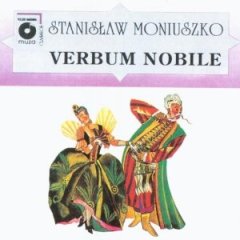Stanislaw Moniuszko – Verbum Nobile
Stanislaw Moniuszko – Verbum Nobile

01. Uwertura 02. Introduction 03. Recitativo and arioso 04. Recitativo and song 05. Recitativo and aria 06. Recitativo and duetto 07. Recitativo and terzetto 08. Recitativo and dumka 09. Recitativo and aria 10. Recitativo and duet 11. Finale Serwacy Ładoga – Andrzej Kizewetter (bas) Zuzia, jego córka – Krystyna Pakulska (sopran) Marcin Pakuła – Marian Kondella (baryton) Stanisław, jego syn – Jan Czekay (baryton) Bartłomiej, stary sługa Marcina – Edward Kmiciewicz (bas) Chór i Orkiestra Państwowej Opery w Poznaniu Chorus and Orchestra of the Poznan State opera) Robert Satanowski – conductor
Verbum nobile, opera jednoaktowa, libretto Jana Chęcińskiego. Młody szlachcic Stanisław ulega wypadkowi podczas podróży. Opiekę nad chorym roztacza szlachcianka Zuzia z pobliskiego majątku. Młodzi zakochują się w sobie. Ojciec Zuzi - pan Serwacy Łagoda oświadcza, że z tej miłości nic nie będzie, bo gdy Zuzia była jeszcze dzieckiem dał "nobile verbum" (szlacheckie słowo honoru) swemu przyjacielowi - Marcinowi Pakule, ze córka zostanie żoną jego syna. Podczas gdy młodzi rozpaczają - zirytowany Serwacy daje kolejne "nobile verbum", że Zuzia nigdy nie wyjdzie za Stanisława. Po wielu perypetiach okazuje się szczęśliwie, że to właśnie Stanisław jest synem Marcina Pakuły i młodzi się pobierają. Prapremiera utworu odbyła się w dniu 1 stycznia 1861. Opera jest uważana przez krytyków za dojrzały przykład polskiej opery komicznej.
Stanislaw Moniuszko was born on May 5,1819 to the patriotic family of Polish landowners settled in Ubiel, near Minsk (now: Belarus). He died on June 4, 1872 in Warsaw. His interest in music became evident early in his childhood. He was introduced to the rudiments of music by taking private piano lessons. His formal music education took place in Berlin in 1837 where under Carl Friedrich Rungenhagen he studied composition and choral conducting. Several of his songs composed during this period were published by the firm of Bote & Bock and were favorably received by the music critics. Moniuszko's major operatic compositions: Halka, Straszny dwor (The Haunted Manor), Flis (The Raftsman), Hrabina (The Countess), and Verbum Nobile. The common trait shared by all these works are librettos which while depicting Polish nobility and gentry, and sometimes even the characters of common origins, above all, emphasized Polish customs and traditions, and at the time of national strife, sustained and fostered patriotic feelings. The first part of the 19-th century is marked in the history of Poland by her loss of statehood and the portion of her territories between the neighbors. The music of Moniuszko's works is largely representative of the 19-th century opera, given the extensive use by the composer of arias, recitatives and ensembles, with the exception of Straszny dwór (The Haunted Manor), where beautifully scored choral parts testify to Moniuszko's mastery of writing for many voices. His music too, although stylistically distinct, evidently incorporates many national motifs: Polish dances popular among upper classes such as polonaise and mazurka, and folk tunes and dances such as kujawiak and krakowiak. (text courtesy of UCS Polish Music Center ).
Last Updated (Friday, 04 January 2013 14:42)








